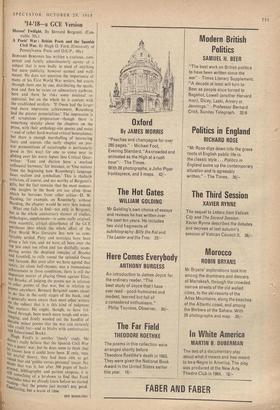'14-'18--a GCE Version
BERNARD BERGONZI has written a cautious, Com- petent and faintly schoolmasterly survey of a subject that is now badly in need of anything but mere publicity, however earnest and well- meant. He does not question the importance of many of his First World War writers, but coasts through them one by one, distributing the spoils: now and then he raises an admonitory eyebrow, here and there he risks some minimal re- appraisal, but on the whole he is content with the established verdicts: 'If Owen had the larger and more impressive achievement, Rosenberg had the greater potentialities.' The impression is of scrupulous preparation—though there is something sketchy about the chapters on the prose, with their anthology-size quotes and notes —and of rather hard-worked critical benevolence, but there is enough marshalling of interesting facts and sources (the early chapter on pre- war premonitions of catastrophe is particularly good in this way) for one to come near to gliding over his worst lapses into Critical Quar- terlese: 'Tone and diction have a marked colloquial bareness,' for instance, or 'One notices from the beginning how Rosenberg's language fuses realism and symbolism.' This is rhubarb criticism, of course, and not worthy of Bergonzi's gifts, but the fact remains that the most memor- able insights in the book are too often those which he borrows from other critics—D. W. Harding, for example, on Rosenberg: without Harding, the chapter would be very thin indeed.
What one fails to find—not only in Bergonzi, but in the whole anniversary shower of studies, anthologies, supplements—is some really original, even eccentric, critical disturbance of the GCE antitheses into which the whole affair of the First World War literature has now so com- fortably settled. Piety and nostalgia have been given a fair run, and we have.all been over the tot) just once too often and too dutifully, scam- pering across the despised remains of Brooke and GrenfeU, to rally round the splendid Owen and Sassoon. But even after we have agreed that sanity, let alone half-rhymes, was a tremendous achievement in those conditions, there is still the important matter of placing Owen against Eliot, not Brooke, of judging the poems not in relation to other poems of that war, but in relation to Poems anywhere. Bernard Bergonzi seems about to do this in the early stages of his book, and Is generally more aware than most other writers °o the subject that it is this kind of judgment that matters. He ought, though, to have fol- lowed through, been much more tough and wide- ranging, and firmly weeded •out the handful of durable minor poems that the war can certainly take credit for—and to blaies with anniversaries and Educational Books. , Hugh Ford's is another, 'timely' study. He uwoesn't really believe that the Spanish Civil War he a poets' war, but he does seem to think that °hi knows how it could have been. If only, runs „,,s Wistful theory, they had been able to get doubt that old 'public versus personal' teaser. No .1,°.subt. that was it, but after 300 pages of back- ground, bibliography and patient exegesis, it is still something of a let-down to find that Ford concludeswhat we already knew before we started '" ding—that the poems just weren't any good. C°Infclting, but a waste of time.
IAN HAMILTON






































 Previous page
Previous page